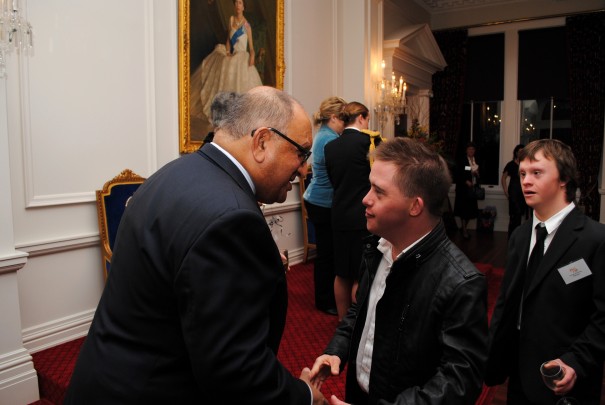New Zealand Down Syndrome Association 30th Anniversary Reception

For more photos, click here.
I begin by greeting everyone in the languages of the realm of New Zealand, in English, Māori, Cook Island Māori, Niuean, Tokelauan and New Zealand Sign Language. Greetings, Kia Ora, Kia Orana, Fakalofa Lahi Atu, Taloha Ni and as it is the evening (Sign)
I then specifically greet you: Neville Strong, President of the New Zealand Down Syndrome Association and members of the National Executive, notably Carmen Slater, Vice-President; Tania Garrett, Treasurer; Zandra Vaccarino, Chief Executive; Linda te Kaat, National Administrator; Representatives from regional Down Syndrome Associations, and Disability Support Organisations; Distinguished Guests otherwise; Ladies and Gentlemen.
It is a great pleasure for Susan and I to welcome you all to Government House in Wellington for this reception to mark the 30th anniversary of the establishment of the New Zealand Down Syndrome Association.
As Patron of the Association I will shortly have the pleasant duty of awarding a life membership to Merrill Holdsworth later in the proceedings, but before doing so, I would like to say a little about the significance of this anniversary.
The welcome I have just offered is special for three reasons. The first relates to Government House. This house has just reopened 48 days ago, after being closed for more than two years for a major Conservation Project. During that time, it was literally pulled apart and put back together, receiving a new roof, new services, considerable earthquake strengthening as well as general refurbishment. I trust that many of you will take an opportunity to look around the House, now restored to its Edwardian style and enjoy its art and artefacts at the end of the ceremony.
The second reason relates to Susan and I and that it has been a continuing pleasure for us both to maintain a connection with those living with Down Syndrome, and their families, friends and supporters during our term. Since coming into the role in August 2006, it has been an honour to host T4T events at Government House in Auckland and Wellington, as well as awarding the Frances Clarke Memorial Awards at a number of Wellington ceremonies.
Through these ongoing connections, we have learnt a great deal more than we did about Down Syndrome. We have come to better understand that despite years of intensive research by scientists that no-one really yet knows why some people have the extra chromosome that results in the Syndrome. While Down Syndrome is also more common than most people realise, it is never anyone’s fault—it just happens. In New Zealand, it is estimated that one or more babies will be born every week with Down Syndrome. People with Down Syndrome, and their families, face a number of hurdles in life, many of which are not of their own making.
This brings me to the third and final reason for welcoming you here which is the Down Syndrome Association. Overcoming hurdles that Down Syndrome may bring is not something that can be done alone. Information, advice and support are needed.
That support can take many forms. This can be a quiet chat over a cup of tea about the vicissitudes of life, or an anonymous call on an 0800 number or it be can lobbying government agencies for better services for those with intellectual and physical disabilities.
All aspects, but particularly the last, is where the work of the New Zealand Down Syndrome Association has been so valuable. For 30 years it has been a national and respected voice for the Down Syndrome community. It has worked with regional associations and other organisations in the sector to ensure that those living with Down Syndrome receive both the quantity and quality of services they need. The Association’s members have also been there for parents and families as they coped with a new child diagnosed with Down Syndrome and the first years of childhood. None of this would be achieved without many hours of voluntary support by its members throughout the years.
Equally importantly, the Association has shown fellow New Zealanders that people with Down Syndrome are more than a label to be pigeonholed. Rather all are individuals, each with unique appearance, personality and abilities. They each make a contribution to our society and economy. Most of all, their achievements in the face of adversity provide inspiration to us all.
What the Down Syndrome community wants is not special treatment, but rather acceptance and opportunities for meaningful participation in our society. This sort of point was well made in the Association video where a mother talks of her son being at their local primary school. Overlaid with footage of her son playing with other children, the mother is heard to say as follows:-
“He sees other children that he knows and his face lights up and in watching other children playing with him, he’s just an accepted part of their day and their world and that’s all you want. That’s all you want—for him to be an accepted person with other children.”
I therefore want to take this opportunity congratulate the New Zealand Down Syndrome Association on the occasion of its 30th anniversary - for reaching this important milestone and for its work in making people living with Down Syndrome an accepted part of our world.
And on that note of thanks and congratulations, I will close in New Zealand’s first language Māori, by offering everyone greetings and wishing you all good health and fortitude in your endeavours.
No reira, tēnā koutou, tēnā koutou, kia ora, kia kaha, tēnā koutou katoa.
